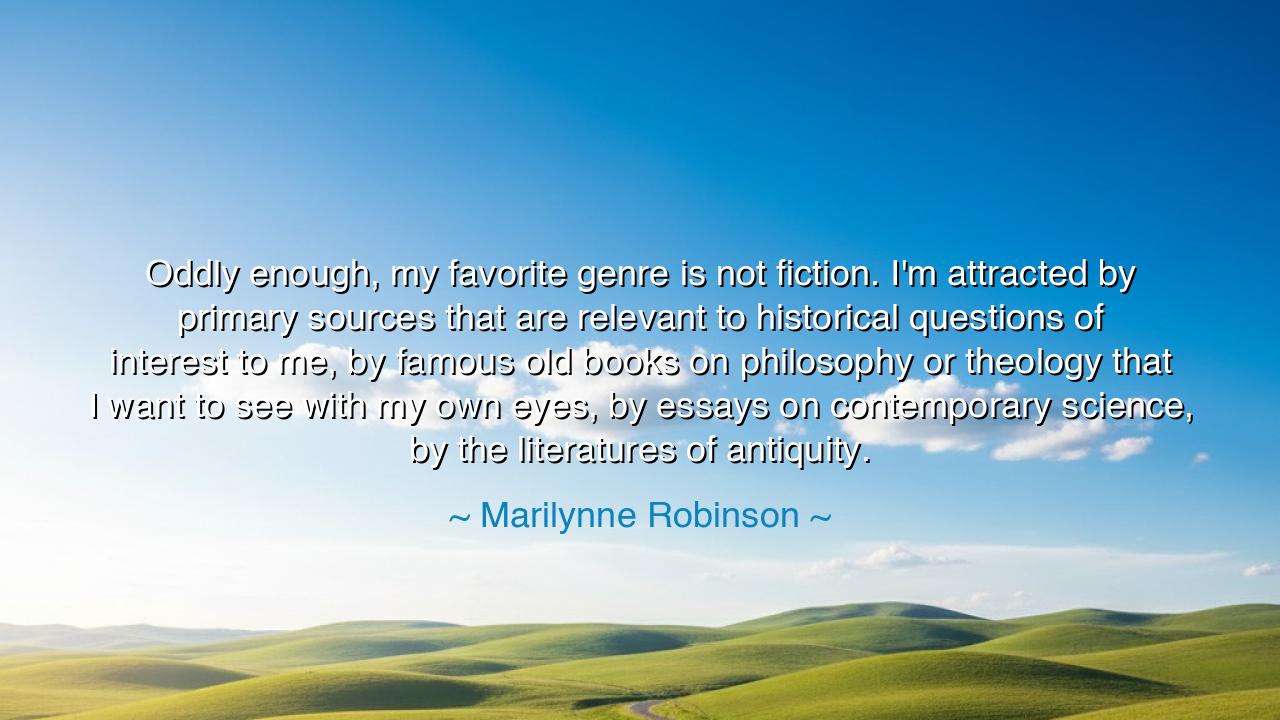
Oddly enough, my favorite genre is not fiction. I'm attracted by
Oddly enough, my favorite genre is not fiction. I'm attracted by primary sources that are relevant to historical questions of interest to me, by famous old books on philosophy or theology that I want to see with my own eyes, by essays on contemporary science, by the literatures of antiquity.






Host: The room is quiet, the soft glow of the lamp casting a warm light across the space. Outside, the world is still, the evening’s peacefulness settling in. Jeeny sits on the couch, a cup of tea resting in her hands, her eyes distant but focused. Jack, standing near the window, gazes out at the darkened world, clearly deep in thought. The calm atmosphere feels like a perfect setting for a conversation about the pursuit of knowledge and intellectual curiosity.
Jeeny: “Jack, I came across a quote from Marilynne Robinson today that I found really interesting,” she says softly. “She said, ‘Oddly enough, my favorite genre is not fiction. I’m attracted by primary sources that are relevant to historical questions of interest to me, by famous old books on philosophy or theology that I want to see with my own eyes, by essays on contemporary science, by the literatures of antiquity.’ What do you think about that?”
Jack: He turns slowly, a thoughtful expression on his face. “I love that. It’s interesting how she’s saying that her interest isn’t in fiction but in more foundational and exploratory works — the texts that give us direct insight into the world’s great ideas and questions. It’s like she’s saying that reading primary sources, whether philosophical, theological, or scientific, gives her a deeper understanding of the world. It’s not just about reading stories, it’s about connecting to the raw thoughts and beliefs that have shaped human history.”
Jeeny: “Exactly. Fiction tells us stories, but primary sources tell us about the world itself — about how we’ve thought, lived, and created meaning throughout time. It’s like Marilynne Robinson is drawn to the origins of ideas, to the foundational texts that have influenced how we see the world and our place in it. Whether it’s ancient literature, philosophy, or science, those works are about seeking understanding on a deeper, more personal level.”
Host: The light in the room seems to soften, as though the conversation is uncovering something more profound about the value of knowledge and exploration. Jeeny speaks with an understanding that the pursuit of primary sources is not just about gathering facts, but about connecting with the essence of human thought and intellectual development. Jack stands still, clearly reflecting on how primary sources are a gateway to understanding history, ideas, and human nature.
Jack: “I see what you mean. It’s about finding the original ideas, the ones that have shaped entire fields of thought. When you read something like an ancient text on philosophy or a historical account, you’re getting a direct link to the past, to the thinkers who shaped the very ideas we take for granted today. It’s like Marilynne Robinson is saying that to understand the present, we have to engage with the sources that informed it.”
Jeeny: “Exactly. It’s about going beyond the narrative to the roots. Primary sources are the foundation of our knowledge, and by engaging with them directly, we gain a more authentic understanding of history, philosophy, theology, and science. We’re not just reading stories or interpretations — we’re reading the thoughts and ideas that have formed the basis of everything we know.”
Host: The room feels quieter now, as if the conversation has shifted into a deeper understanding of the pursuit of knowledge. Jeeny and Jack reflect on the importance of primary sources in shaping not just historical knowledge, but the very way we think and understand the world. Marilynne Robinson’s quote serves as a reminder that the essence of human thought, from ancient literature to contemporary science, is found in the foundational texts that shape our ideas and worldview.
Jack: “It makes sense. When we engage with the original works, we’re not just learning what others have interpreted from them; we’re connecting to the source itself. It’s like we’re having a direct conversation with history, philosophy, or science — not filtered through modern interpretations, but in its most authentic form.”
Jeeny: “Yes, it’s about the direct connection to the past. Primary sources offer us a chance to experience the world as it was seen by those who lived through it, to connect with their questions, their ideas, their struggles. It’s not just about gathering information, but about engaging with the thought process of the people who shaped those fields.”
Host: The quiet in the room feels deeper now, the weight of their conversation settling in. Jeeny and Jack sit together, reflecting on how the pursuit of knowledge, especially through primary sources, is a way to connect with the roots of human thought and understanding. Marilynne Robinson’s words serve as a reminder that true intellectual exploration involves not just reading stories, but seeking out the ideas and texts that have shaped the world, offering a deeper connection to history, philosophy, theology, and science.






AAdministratorAdministrator
Welcome, honored guests. Please leave a comment, we will respond soon